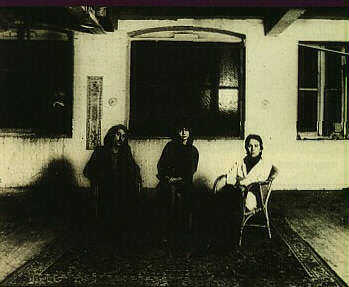
I'd seen the album in a remainders
bin at my local record store and remembered a positive review in the NME
about 'quirky pop'. But I think it was the fact that it was on Virgin records
that finally persuaded me to buy it. They just seemed to release a lot
of interesting stuff that I'd already bought (including Robert Wyatt's
marvellous 'Rock Bottom' which was to influence me forever and a day).
But the cover was intriguing as well - a black and white photo, heavy on
the shadows, with all three members sitting down and looking straight at
the viewer. Was there some significance to the Eastern looking scroll behind
the long haired male and the Persian style rug that framed them? Was this
room where the band lived? (I thought all bands lived in share accommodation,
ya see). There was just something slightly weird and off beat about the
cover, even though a myriad of other bands had used a similar convention
where the members enigmatically look straight at you. Finally, and to some
extent most importantly, Dagmar looked exotic as all get out.
So I eventually bought it and
checked out every nook and cranny of those 12 inches on the way home on
the bus. When I finally played the first track, 'Casablanca Moon', I was
mesmerised by the melody and lyrics ("He
used to wear fedoras but now he sports a fez, there's cabalistic innuendoes
in everything he say, sucking on a cigarette picking up the threads...").
I was hooked for life, basically.
[Some asides here before
this gets properly started - This page is not aimed at being a definitive
account of the band's history with dates and times and lists of personnel,
etc. Instead, it's a personal account of my love of the band's music and
personalities. If you want all the finicky details then see the links on
my Music page. Lastly, I should also note that
I make many assertions throughout this page that should be taken in the
ironic spirit in which they are written.]
Slapp Happy are
Dagmar Krause on vocals,
Peter
Blegvad on guitar and
Anthony Moore on keyboards (they all do
other stuff as well) with Blegvad and Moore as the main song writers. For
many, many years I thought that the long haired male on their 'first' cover
was Moore and the shorter but more intellectual looking one was Blegvad.
I got quite a shock in the mid eighties when I realized my mistake : all
those years of linking an image to an ideal down the drain - damn. For
various recording sessions they've been backed by members of Faust and
Henry Cow and some other (at the time) nameless musicians.
They were formed in Europe in
the early 70's with, so rumour has it, an intention of creating pop music
that really wasn't pop music; of fooling the record companies into letting
them release records. Audacious if true, but I'm sure there's a bit of
myth making in all this. However, Blegvad had some connections with the
nascent Faust and their producer Uwe Nettlebeck and so they did
manage to get a small recording deal with German Polygram for :
"Sort Of"
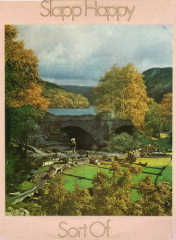 I
didn't hear this album till the early 80's when I found a copy of the Japanese
pressing at an import record store and I'd already been in love with them
for many years. My expectations were running high but floundered on the
somewhat patchy quality of the songs. The sound throughout is spare, dry
and separated with that patented Uwe snare drum all over the place. It's
hardly a classic first album but there's enough in there to interest almost
any pop aficionado. Here's the best bits : I
didn't hear this album till the early 80's when I found a copy of the Japanese
pressing at an import record store and I'd already been in love with them
for many years. My expectations were running high but floundered on the
somewhat patchy quality of the songs. The sound throughout is spare, dry
and separated with that patented Uwe snare drum all over the place. It's
hardly a classic first album but there's enough in there to interest almost
any pop aficionado. Here's the best bits :
"Just a Conversation"
is a beautiful start with wah wah guitar, a lazy, dreamy feeling and a
sublime, simple melody. Dagmar's voice is as crystal clear and succinct
as it continued to be.
"Tutankhamun" is silly
and infectious with a ring-modulated guitar riff based on some song from
the 60's whose name I can never quite remember (just on the tip of the
tongue after all these years - ah, yes, there it is "Walk Don't Run"
[thanks to one and all who prompted me]).
"Blue Flower" is a twisted,
momentous pop song driven by hammered piano : maybe Dusty Springfield after
a night on the booze.
"Who's Gonna Help Me Now"
- a cod C&W singalong relating pain and misery because her man "swore
he'd be back in a Cadillac". As soon as I heard it I knew that I'd finally
found a Slapp Happy song that I could play myself and do justice to (see
the band No Night Sweats).
"Heading for Kyoto" has
a marvellous, jumpy, fractured rhythm and shoop-de-doo-wop in the chorus
- a great finisher.
"Jumpin' Jonah" (an extra
track on the CD re-release) is a terrific find - a hard walking rhythm,
fuzzed wah guitar, a bluesy progression with gospelly vocals and that Faust
synth sound roaring through near the end.
Virgin Re-Recording
The band recorded another set
of songs with Faust, relocated to the UK and Virgin were quickly interested
in the tapes. So, another record company 'tricked' into releasing their
material! World domination awaits. However, just as things were settling
in, Virgin asked for a full re-recording for some reason : not slick enough
or something like that. I'm in two minds about the relative merits of the
recordings. On some tracks, the continuing sparseness of "Sort Of" lets
the songs speak a bit more freely but some of the augmented orchestration
on the Virgin recordings is almost perfect as well. In any case, I'm just
thankful that both are still available. The Faust backed recordings have
been called variously "Slapp Happy or Slapp Happy" and "Acnalbasac Noom"
and the Virgin recordings have been called variously "Slapp Happy" or "Casablanca
Moon". The main difference is that 'Acnalbasac' contains the smartly chirpy
"Charlie and Charlie" whilst 'Casablanca' contains the growling but chirpy
"Haiku". Both are great and every home should have them. The current ReR
CD release of 'Acnalbasac' contains some extra tracks as well - the belated
single "Everybody's Slimmin'" and some demos that eventually surfaced on
Blegvad and Moore solo efforts. In the details below, I'll refer to whichever
version I prefer for succour :
"Acnalbasac Noom" and "Casablanca
Moon"
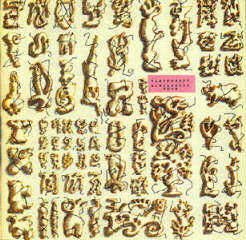 The
first thing that's plain is that Blegvad and Moore have spent more time
on both the song structures and the lyrics. All of them are tightly and
effectively written and the lyrics twist and twine their way through glorious
word plays and semantics - probably the thing that has made them so, ahem,
well known through the years. All the melodies have stuck fast in my mind
since I first heard them but here's my (current) favourites : The
first thing that's plain is that Blegvad and Moore have spent more time
on both the song structures and the lyrics. All of them are tightly and
effectively written and the lyrics twist and twine their way through glorious
word plays and semantics - probably the thing that has made them so, ahem,
well known through the years. All the melodies have stuck fast in my mind
since I first heard them but here's my (current) favourites :
"Casablanca Moon", is
a sort of tango, redolent of Bogart and Galouise. The swirling violin on
'Casablanca' will always be evocative for me but the 'Acnalbasac' version
has a late night Oporto cafe feel that's more in tune with the 'spy' theme.
"Michaelangelo" has a
gloriously silly lyric about painting the Sistine and dissection and poetry
backed up by plinky mandolin, accordion, kazoo and jugs.
"Dawn" sounds epic with
urgent vocals, a tight brass section and fairly straight ahead rock drumming
and bass.
"The Secret", for me,
is the best love song in pop : a smoky, crooning delivery moving onto a
50's doo-wap pastiche. However, "A Little Something" is the 2nd
best. Or maybe
it is the best after all. My opinion on this changes
all the time. But when the violin solo on "Casablanca's" ALS starts above
those J.H. Peron bass two notes and eventually drifts into some swinging
C&W fiddle then I'm in some sort of rapture.
"The Drum" has an almost
funky beat and a convoluted, 'infinite' melody that matches anything Bacharach
has written.
It should be stated clearly
that, if everyone in the world owned this record, it would be a better
place.
Merging and Dissolving
Henry Cow were another of the
bands recording for Virgin soon after the label was initiated. Following
a period of mutual admiration and, apparently, a night of much alcohol,
the bands merged. This resulted in the recording of "Desperate Straights"
which can usefully be seen as a Slapp Happy album with Henry Cow as the
backing band and, a little later, "In Praise of Learning" which was to
have been a collaborative effort but which turned out to be Henry Cow with
some extra input (mainly on the excellent heart-starter "War"). During
this time and with some acrimony (everyone involved is quite cagey about
these events and so the actual story might never be fully known to outsiders)
Anthony Moore left, Peter Blegvad was fired ("ah, the Cow are full of bull"
- PB '75) and Dagmar became a member of Henry Cow. Fantastic bass player
John Greaves eventually left Henry Cow as well and joined forces with Blegvad
to record the marvellous "Kew:Rhone" album with Lisa Hermann.
"Desperate
Straights"
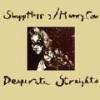 It's
obvious from the very first chord of this album that Slapp Happy wanted
to make a more serious record. It was most probably the Henry Cow influence
that caused this change although Moore's early composed pieces were always
quite intellectual. Many fans would have been nonplussed about the change
whilst many more would have loathed it. There's still humour and affection
in many of these songs but it's been tempered by sadness and not just a
little bit of fear. For all it's loss of innocence, it's still a superb
batch of off-beat songs that I continue to cherish : It's
obvious from the very first chord of this album that Slapp Happy wanted
to make a more serious record. It was most probably the Henry Cow influence
that caused this change although Moore's early composed pieces were always
quite intellectual. Many fans would have been nonplussed about the change
whilst many more would have loathed it. There's still humour and affection
in many of these songs but it's been tempered by sadness and not just a
little bit of fear. For all it's loss of innocence, it's still a superb
batch of off-beat songs that I continue to cherish :
"Some Questions About Hats"
starts the album with a clang and the moody oboe of Lindsay Cooper. Dagmar's
voice changes from the sultry cabaret style of the last albums to something
more experimental - a taste of things to come in later work.
"A Worm Is At Work" is
a philosophical rant - ruminating on the process of stringing words together
(with many references to past discussions) over a galloping, piano and
bass led orchestration.
"Desperate Straights"
is a soft piano piece in 3/4 by Anthony Moore that serves as a beautiful
interlude.
"Riding Tigers" is another
small epic with duelling picked guitars and a smothered bass. Achingly
sad.
"Strayed" is the real
start of Blegvad's solo career and is the most joyous song on the album,
even if it is about infidelity. With tremeloed hawaiian guitar and a swinging
backbeat, it's like The Big O on speed. It's also the best pop song ever
written.
Post Cow
Peter Blegvad continues to this
day with a small niche solo career (currently 'backed' by Greaves and Henry
Cow drummer Chris Cutler) and all of his releases contain glimpses of that
old Slapp Happy magic topped with some more heartfelt moments. Anthony
Moore tried his hand at being a pop star of sorts but, after releasing
a few albums of slightly overwrought rock, slipped slightly out of sight
until writing the lyrics for some later Pink Floyd albums. Henry Cow spent
a few more years playing live but eventually split up - Dagmar stayed with
Cutler and guitarist Fred Frith as the Art Bears (whose albums are all
good including the excellent "Hopes and Fears") and has a long lasting
solo career as well built initially on interpretations of Brecht and Eisler.
Although a small reformation
occurred in the mid 80's to write the opera "Camera" for Channel 4 (which
I've still yet to hear), it wasn't until 20 years later when V2 Records
was started up, that Slapp Happy almost, sort of, kind of, actually reformed
to create an album in celebration of the original Virgin spirit (or something).
"Ca Va"
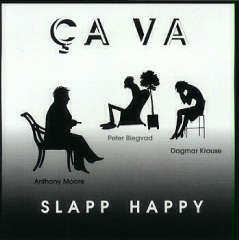 It
was always going to be impossible to live up to the delights of 'Casablanca
Moon' and 'Desperate Straights' after so many years of expectation but,
whilst not exactly setting the world on fire, 'Ca Va' still contains some
terrific moments : It
was always going to be impossible to live up to the delights of 'Casablanca
Moon' and 'Desperate Straights' after so many years of expectation but,
whilst not exactly setting the world on fire, 'Ca Va' still contains some
terrific moments :
"Scarred For Life" and
"King of Straw" are great Blegvad songs of mad love gone wrong made
even better by Dagmar's shaky delivery.
"Powerful Stuff" continues
the theme of love and sex with a terrific rising chorus and a stripped
down middle eight.
"Coralie" is the best
Anthony Moore song post 'Desperate Straights' where the rounded piano tones
and his croaky voice combine superbly - and the chorus goes all 80's too.
"The Unborn Byron" and
"Lets Travel Light" make a soft, floating finish - all wisps of
synth and saws and, yep, there's that kazoo again.
They must have enjoyed playing
together again because they performed live at last in a 10 date tour of Japan and
an evening in London. A Japanese only CD release documents this event and,
listening to it's quiet, ambivalent tone, I think you had to be there to enjoy
it properly.
In any case, hopefully they'll continue to
make glorious pop for many years to come. |